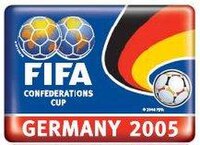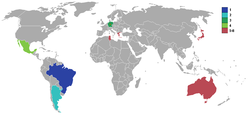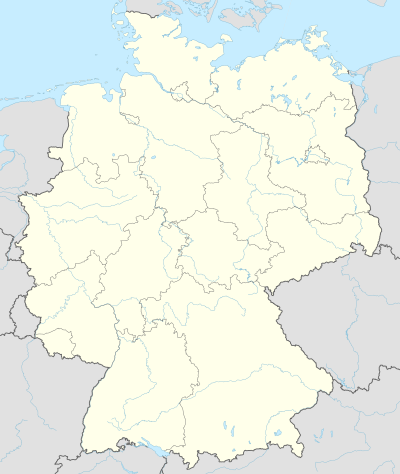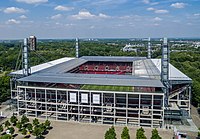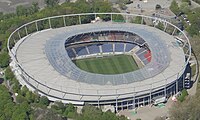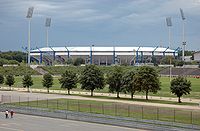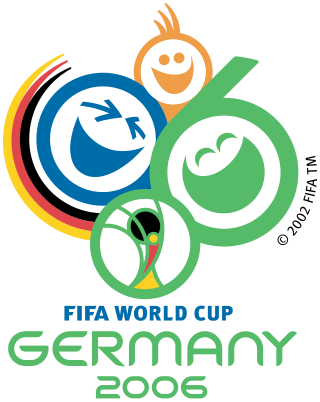
The 2006 FIFA World Cup was the 18th FIFA World Cup, the quadrennial international football world championship tournament. It was held from 9 June to 9 July 2006 in Germany, which had won the right to host the event in July 2000. Teams representing 198 national football associations from all six populated continents participated in the qualification process which began in September 2003. Thirty-one teams qualified from this process along with hosts Germany for the finals tournament. It was the second time that Germany staged the competition and the first as a unified country along with the former East Germany with Leipzig as a host city, and the 10th time that the tournament was held in Europe.

The 2003 FIFA Confederations Cup football tournament was the sixth FIFA Confederations Cup, held in France in June 2003. France retained the title they had won in 2001, but the tournament was overshadowed by the death of Cameroon player Marc-Vivien Foé, who died of heart failure in his side's semi-final against Colombia. Foé's death united the France and Cameroon teams in the final match, which was played even though team players from both sides had explicitly stated that the match should not be played out of respect for Foé. France went on to win the trophy with a golden goal from Thierry Henry.
Play in Group B of the 2006 FIFA World Cup began on 10 June and completed on 20 June 2006. England won the group, and advanced to the round of 16, along with Sweden. Paraguay and Trinidad and Tobago were eliminated.
Play in Group C of the 2006 FIFA World Cup began on 10 June 2006 and ended on 21 June. Argentina won the group and advanced to the round of 16, along with the Netherlands. The two sides tied on points in the standings, but Argentina won the tie-break on goal difference and ended the group in first with the Netherlands in second place. The Ivory Coast and Serbia and Montenegro failed to advance.
Group D of the 2006 FIFA World Cup began on 11 June and completed on 21 June 2006. Portugal won the group, and advanced to the round of 16, along with Mexico. Angola and Iran failed to advance.
Group G of the 2006 FIFA World Cup began on 13 June and completed on 23 June 2006. Switzerland won the group and advanced to the round of 16, along with France, who went on to reach the final. South Korea and Togo failed to advance. Switzerland were the only team not to concede a goal during the group stage of the tournament and would become the first team to be knocked out of a World Cup without conceding, losing on penalties after a 0–0 draw with Ukraine in the round of 16.
The knockout stage was the second and final stage of the 2006 FIFA World Cup, following the group stage. The top two teams from each group advance to the knockout stage to compete in a single-elimination style tournament. A match was played between the two losing teams of the semi-finals to determine which team finished in third place.

The 2005 FIFA Confederations Cup final was a football match to determine the winners of the 2005 FIFA Confederations Cup. The match was held at Waldstadion, Frankfurt, Germany, on 29 June 2005 and was contested by Brazil and Argentina. Brazil won the match 4–1.

This article summarises the results and overall performances of Australia at the FIFA World Cup.
Russia have participated in twelve UEFA European Championships, the second-most among all participants of the Euro after Germany, equalled to Spain, five of which were as the Soviet Union and one of which was representing the CIS. As the Soviet Union, their best performance was becoming champions in the inaugural 1960 edition in France, while their best performance as Russia came in the 2008 tournament held in Austria and Switzerland, when they reached the semi-finals.
This is a record of the Netherlands at the FIFA World Cup. The Netherlands entered qualification for 19 of the 22 FIFA World Cup tournaments to date, qualifying 11 times. They have a record of 3 World Cup final appearances without winning the tournament.
The Australia national association football team represented Australia at the FIFA Confederations Cup on four occasions, in 1997, 2001, 2005 and 2017.
The 2014 FIFA World Cup qualification UEFA Group C was a UEFA qualifying group for the 2014 FIFA World Cup. The group comprised Germany, Sweden, Republic of Ireland, Austria, Faroe Islands and Kazakhstan.
Group A of the 2005 FIFA Confederations Cup took place between 15 June and 21 June 2005. Germany won the group, and advanced to the second round, along with Argentina. Tunisia and Australia failed to advance.
Group B of the 2005 FIFA Confederations Cup took place between 16 June and 22 June 2005. Mexico won the group, and advanced to the second round, along with Brazil. Japan and Greece failed to advance.
The knockout stage of the 2005 FIFA Confederations Cup began on 25 June and concluded on 29 June 2005 with the final at the Waldstadion, Frankfurt. It was the second and final stage of the 2005 FIFA Confederations Cup, following the group stage. The top two teams from each group advanced to the knockout stage to compete in a single-elimination style tournament. A third-place match was included and played between the two losing teams of the semi-finals.
Greece have qualified for only four out of seventeen UEFA European Championships, but crowned themselves European champions in 2004. At Euro 2004 they beat hosts and heavily favored Portugal in the final, resulting in their first major tournament win.
As of 2024, Switzerland have appeared at six UEFA European Championships, between 1996 and 2024. They have advanced past the first round three times, reaching the last 16 in 2016 and the quarter-finals in 2020 for the first time, before being eliminated by Spain on penalties following a 1–1 draw after extra time. They again made it to the quarter-finals in 2024 after defeating defending champions Italy 2–0, but were once again eliminated in the quarter-finals on penalties, this time by England.
The Greece national football team represented Greece at the FIFA Confederations Cup on one occasion, a sole appearance in 2005. Greece qualified for the 2005 FIFA Confederations Cup as the UEFA representative after winning UEFA Euro 2004.
Tunisia has participated one times in the FIFA Confederations Cup in 2005, as a representative from Africa after winning the 2004 African Cup of Nations. From its only participation, the team was content with the group stage.
